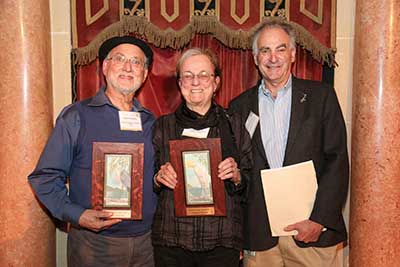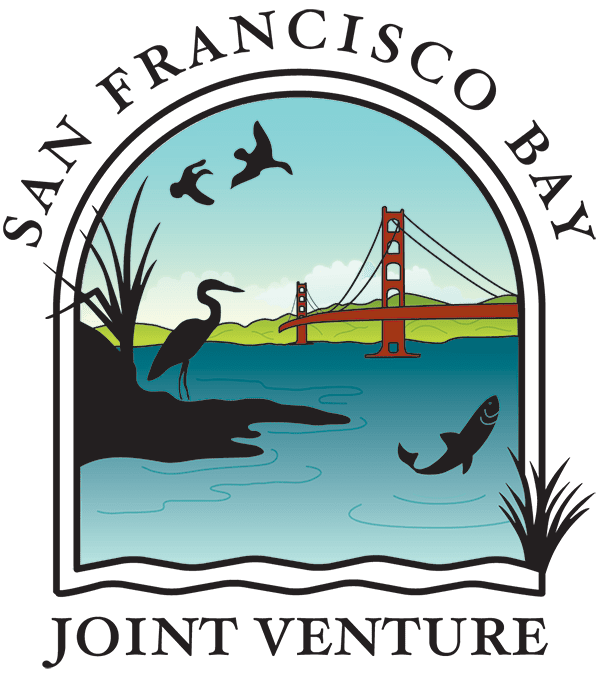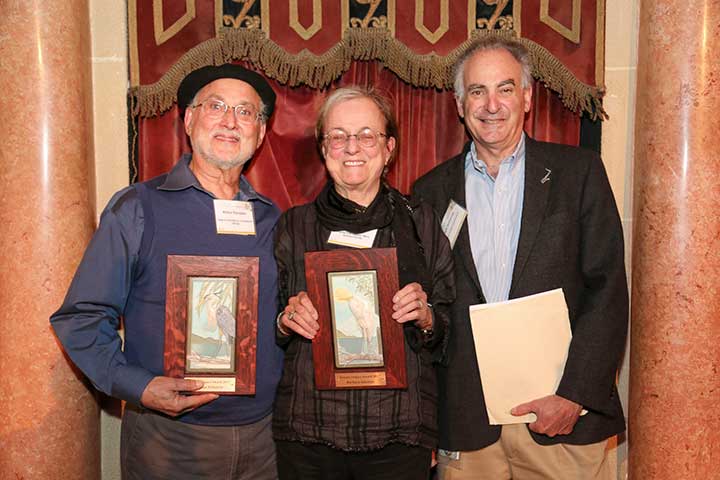Position/Occupation: President, Marin Audubon Society
February 2020

Barbara and Arthur Feinstein (with Sam Schuchat) receiving the 2017 State of the Estuary Legacy award
Barbara Salzman is a legend. If you have ever participated in any stage of wetland restoration work in Marin County you have surely met her. She has been working in the field of conservation and advocating on behalf of wetlands and habitats threatened by development and other stressors since the late 1970’s.
It all began when Barbara joined with other Larkspur residents to oppose a regional shopping center in the property that is now the Bon Air Shopping Center. She asked Audubon to help with identifying birds on the site and has been involved ever since. Barbara was influenced and inspired by Jean Starkweather, Audubon Conservation Chairwoman and a strong advocate for wetlands at the time, along with other Marin Audubon Society (MAS) board members who took on protecting wetlands as a focus because no one else was paying attention to them! “Can you believe that?” she asks incredulously.
In the mid 1980’s, Barbara began to do small enhancement/restoration projects through Marin Audubon Society on properties owned by public agencies, such as the California Department of Fish & Wildlife (then Game), Tam Unified School District, and local governments such as the Marin County Open Space District.
Barbara is an original Management Board member and represents the Bay Area Audubon Council which consists of eight Audubon chapters. When asked why she has elected to spend her time serving in this way, she said she values “the JV because it furthers habitat protection and wetland restoration and provides opportunities to interact and communicate with others who share her interests, as well as opportunities to learn about techniques and procedures that improve habitat restorations.” It also gives her a chance to share what she’s learned with others and further restoration of wetland and Bay habitats. The SFBJV board has benefitted tremendously from her passion and commitment, attention to detail and reliability over the years.
Barbara admits we are currently facing “not only the usual challenges from development, but also new and emerging threats from a changing climate and specifically sea level rise.” So what keeps her going year after year, day in and day out, without taking a dollar for her time or work? She matter of factly and humbly replies, “the opportunities to restore habitats and purchase properties, as well as the challenges and need to overcome these threats.” From her experience, she says “persistence is critical.” Many of the properties she has helped purchase and restore took 20 years (or more) to achieve! Her advice to the rest of us: “hang in there, stay positive and keep busy.” For Barbara, one of the most effective ways to avoid getting bogged down is to be involved in multiple projects/issues. That way, “if one project is having problems, there is always another one to absorb your attention into something else.”
Clearly that has been an effective strategy. Barbara has been involved with about 20 projects, “some substantial and others just small enhancements/restorations, planting natives or removing weeds, most of which connect with and expand adjacent marsh habitats.” The larger projects have mainly been on lands owned by Marin Audubon, the largest of which being a restoration of 335 acres of tidal marsh at Bahia in Novato. In addition to restoring wetlands, MAS has purchased many properties which in turn, has created more restoration opportunities. For those interested, you’ll find a list of projects she has been involved with at the bottom of this biography.
Thankfully, Barbara has been recognized for her many contributions, including: the National Wetlands Award 2004, Womans Hall of Fame, Pacific Sun Heroes of Marin and the 2017 Estuary Legacy Award. And, believe it or not, Barbara still has time for other interests when she is not working for wetlands and bird habitat! She likes to cook, knit, watch and read mysteries, attend yoga classes, and travel. She’s so busy though she says she doesn’t have much time to do most of these things except for the cooking, which she does on an almost daily basis, and the yoga and exercise, which she tries to fit in at least two or three times a week!
Here’s a list of Barbara’s work:
Acquisition and restoration projects:
- Triangle Marsh – Purchased 30 acres in 1999 and restored five acres of tidal marsh and adjacent upland in 2003;
- Simmons Slough – In 2000 and 2003 acquired two parcels of diked historic marsh totaling 145 acres, sold a conservation easement to NRCS, and have been gradually enhancing the seasonal wetlands;
- Petaluma Marsh – Purchased 102 acres in 2003 and restored 85 to tidal marsh several years later;
- Bahia – Purchased – 635 acres restored 335 acres of tidal marsh, about 20 acres of seasonal wetland and 40 acres of upland transition habitat were donated to the Open Space District, 332 acres of diked marsh were restored to tidal marsh in 2008 and 2013;
- Corte Madera Ecological Reserve Expansion – In 2015, purchased five acres of filled historic tidal marsh in 2015 and, in 2018, completed the restoration of it along with one acre of CDFW filled lands to tidal marsh and adjacent upland habitat.
- Tiscornia Marsh – We are currently developing a plan to restore approximately six acres of tidal marsh and 2 acres of adjacent upland at Tiscornia Marsh, on a 20 acre piece of the Bay that was donated to Marin Audubon by Mary Tiscornia. We are working on the restoration plan with a Measure AA Sea Level Rise Adaptation grant.
- Working with Marin Audubon and Marin Baylands Advocates, over the years, acquired many small parcels at Black Point; sections of Arroyo Corte Madera in Mill Valley and Arroyo San Jose in Novato – some enhancement work is being done on many of these properties (pulling weeds, planting of natives).
Early projects on lands owned by others:
- Corte Madera Ecological Reserve – Removed fill to restore tidal marsh and create a habitat island in 1990;
- Mill Valley Marshes, owned by Marin County – Completed several enhancement projects removing fill from tidal marsh in the 1990’s;
- Redwood High School Marsh, owned by the Tamalpais Unified High School District– Enhanced a diked marsh by installing a tide gate and improving channels in 1995;
- Gallinas Creek – Restored tidal marsh in three phases from 1992 to 1997
- Rush Creek and Cemetary Marsh – Completed marsh enhancement in 1999;
- Remillard Pond – excavated sediments to restore habitat.

